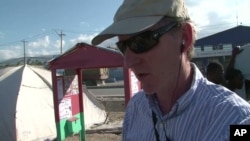More than 800,000 Haitians displaced by last year's devastating earthquake are still living in tent camps scattered around Port-au-Prince. Conditions are often deplorable and life is filled with many hardships. Disputes in the camps often lead to violence, and many have been searching for ways to improve conditions. One international agency has implemented an age-old idea to empower people in new ways.
Every three or four days, Reynald Derassaint stops by the Kan Mayegate tent camp next to the International Airport to empty a suggestion box.
A year after the earthquake, hundreds of thousands of people are still living in tent camps. Frustration is running high, and frayed nerves often lead to violence. So Leonard Doyle, communications director with the International Organization for Migration, came up with the idea to put a suggestion box in some of the camps.
"It is very volatile after the earthquake," said Doyle. "The rumor can flash through a camp. People can get hurt, you can have a riot, the place can get burned down. So, the point was to try and get them reliable information. Either have them know what their benefits are, what is coming their way, or what is not coming their way."
At first, there were fears the suggestion box would raise expectations too high and create an explosion. They decided to put one in Citie Soleil, the poorest slum in Port-au-Prince, as a test. Their fears were quickly dashed. Within a few days they had 900 letters.
"That kind of blew us away, really, and we realized that there is something here that we didn't realize, the frustration in the population," added Doyle. "They are not being listened to. It is one thing to say they are not getting their needs met. But they are not being listened to."
Most letters have a cell phone number on them. IOM staff members send a text message acknowledging they have received the letter.
Doyle says some of the requests have little to do with day-to-day life, such as people saying they are looking for a husband or wife, or want a visa to the United States. But, most deal with very pressing issues like: "I need a new tent," or "I want to send my kids to school."
Before the earthquake, Emmanuel Germiny, 38, worked in construction. He wrote a letter asking for help with employment.
"Before the earthquake, I had a job. And after the quake, I lost my job. Now, I don't have any work, and I don't have any money. I don't have anything to do all day," said Germiny.
Doyle explained to Emmanuel that they can't promise results. The point is a line of communication has been opened. Hopefully, one that will resolve his problem.
"When you write a letter, we take the letter and we give it to the government," explained Doyle. "We give it to the U.N., we give it to IOM and they see your problems. The more people who call, the more letters, the more we hear you, the sooner you get the aid you need."
The letters are tagged according to need, and scanned into a database that is available to other aid and government agencies for action. Doyle likens it to teaching democratic principles, and giving a voice to a segment of Haitian society that has been ignored for a very long time.
"The more you, in a community, beat the drum, the more noise you make, and the more squeaky the wheel, the more oil you get. So, it is essentially, it is how democracy works," noted Doyle.
Mr. Doyle hopes it will also change the way international agencies work by making them more responsive to the needs of the communities they serve.




